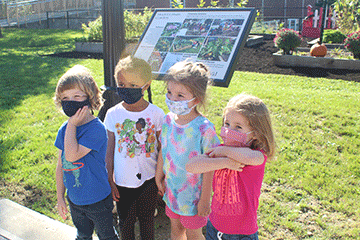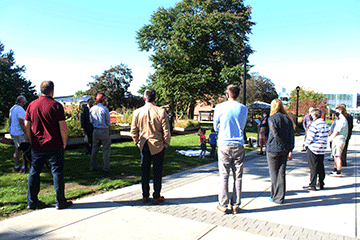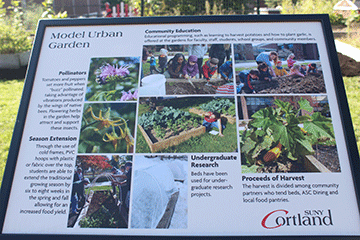
10/12/2021
The nine beds of SUNY Cortland’s Model Garden have been in their places for at least three years.
Starting today, members of the campus community will have a better idea of what exactly they are.
A newly installed sign beside Van Hoesen Hall now explains the many ways the garden plots support the campus’ major mission for environmental sustainability.
About 25 members of the SUNY Cortland campus community gathered beside the splash of green and color outside Cornish Hall across from Memorial Library today, Oct. 12 to mark the installation of the new sign.
During the brief ceremony on the mild and sunny fall afternoon, SUNY Cortland President Erik J. Bitterbaum marked the evolution of the gardens in the life of the campus.
Faculty, staff and students serving on the Garden Advisory Committee joined children and their caregiver from the SUNY Cortland Child Care Center as they celebrated the occasion with Bitterbaum.

“I don’t know if you garden but there’s nothing more fun than to plant something, grow it and then to eat it,” he said. “Things taste better if they come from your garden.”
Bitterbaum explained that the university for many years tended gardens located further down toward Van Hoesen Hall as a means to prepare future educators to teach science.
“When we renovated Cornish Hall we had to take it out,” Bitterbaum said. “I think it was the Garden Advisory Committee that suggested we put it back in.”
Students enrolled in the Biological Sciences Department and the School of Education expressed the most need for their restoration.
Auxiliary Services for a while maintained some beds near Neubig Hall to grow produce and herbs to enhance the dining hall menu.
Several years ago, the raised wooden beds featuring a mulch pathway were added in their current location where they are used by many different groups. Children from the Child Care Center practice growing things like garlic in several beds and space is available whenever a student majoring in biology wishes to conduct horticultural experiments.
Bitterbaum noted that the plants growing in the beds support at least 20 different kinds of bees. That has contributed to the campus’ overall national distinction as a Bee Campus USA site since 2016. Biological science majors currently are growing milkweed plants to attract Monarch butterflies.

To earn the Bee Campus certification, colleges must do much more than raise awareness. They must manage campus environments with landscapes that encourage bee foraging and nesting and recognize the importance of pollination in sustaining agriculture and natural habitats.
“That’s an amazing thing for such a small plot of ground to attract so many bees and wasps,” Bitterbaum said.
“We’re trying to get a speaker to come here and speak about pollinators this year,” said Sarah Beshers, Garden Advisory Committee chair, professor of health and community health fieldwork coordinator. “I think the initial mission was growing herbs and veggies with an emphasis on the organic part: crops that wouldn’t use herbicides and pesticides; and we don’t.
Bitterbaum mentioned the ceremony also marked the related bioswale project built down by the Student Life Center.
The Model Garden hasn’t exhausted its possible uses.
“We could get our food pantry up and running with fresh food,” Beshers said. “I don’t know what’s involved to get that here. Perhaps a student could do an independent study to work on it.
“I think there’s a bright future here but it’s just connecting all the dots,” Beshers said.
The volunteer Garden Advisory Committee seeks to facilitate educational use of college gardens in classroom activities, service learning and interactions with the community; to organize faculty, staff, students and community members to assist with gardening; and to coordinate the university’s Bee Campus USA activities.
The committee also includes Jeremy Zhe-Heimerman, coordinator of Assistive Technology and Test Administrative Services; Josh McLaughlin, head grounds supervisor; Karen Diescher, a teacher with the Child Care Center; Louise Mahar, assistant director, recreation sports, fitness; Jeff Scott, director of dining services; and Beth Klein, professor, childhood/early childhood education and campus sustainability coordinator.